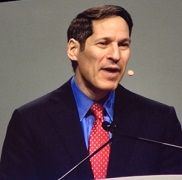CDC's Tom Frieden: We Need a Revolution
When it comes to funding, research, and preventing illness mental health and physical health tend be seen as separate arenas.The CDC's top doc Tom Frieden vowed to change that.

When it comes to funding, research, and preventing illness mental health and physical health tend be seen as separate arenas.
Addressing the American Psychiatric Association’s members at the APA’s annual meeting in Atlanta, GA, the US Centers for Disease Control and Prevention’s director Tom Frieden, MD, vowed to change that.
“It’s not a dichotomy,” Frieden said, calling for a "Reciprocal Revolution" in which the CDC includes improving the nation's mental health in its goals.
Already the CDC does work in many areas that involved mental health, including smoking, drinking, opioid dependency and other conditions with a psychiatric component that impact physical well-being.
He spoke of his own firsthand experience with psychiatry.
“My first job was as a psychiatric aide,” he said. Frieden said he had seen “Wet-packing [wrapping patients in wet sheets to restrain them], quiet rooms, and ECT [electroconvulsive therapy]” and knew something about the changing environment psychiatrics work in.
Mental health problems are creating many challenges that he wants the CDC to address, he said.
For instance the 24% rise in US suicides from 199 to 2014 “is very challenging,” Frieden said. One solution could be limiting “easy access to lethal means” like guns, he said.
He strongly endorsed new laws creating benefits parity for behavioral health care.
The question, he said, is “how can we get to scale in mental health?” when about half of patients who need care seek it and only half of those are treated.
“Let’s look at what works in the real world,” he said, calling for more randomized controlled trials of mental health therapies.
Frieden’s vision, he said, is a nation where no child suffers abuse or neglect, all are free from addiction, have a healthy weight, good habits, and practice ‘mindfulness’.”
Current statistics show many alarming health trends, such as one in three children being obese and one in 10 suffering from abuse or neglect.
“We are failing the next generation,” Frieden said, and need to do better.
Some measures to do that are not directly health-related, such as the earned income tax credit, he noted. But by improving financial well-being of many, the tax credit has reduced stress on parents, so “it’s a pro-health program.”
By recognizing the force of individual behaviors on health, and changing them, it is possible to change a society, he concluded.